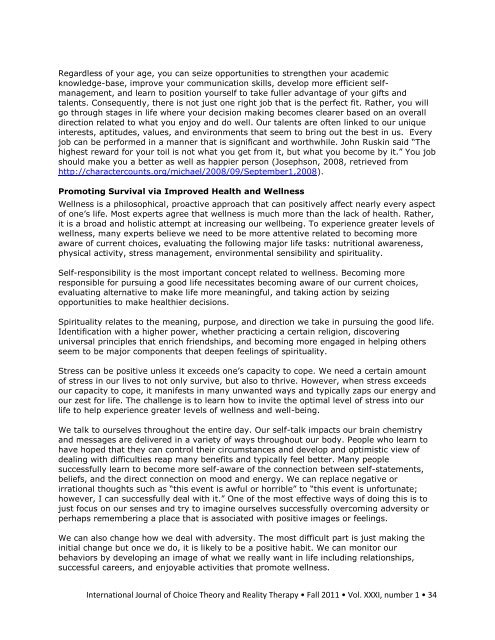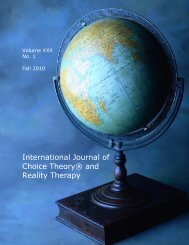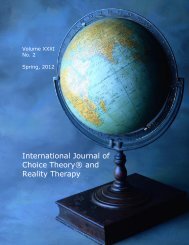International Journal of Choice Theory® and Reality ... - CTRTJournal
International Journal of Choice Theory® and Reality ... - CTRTJournal
International Journal of Choice Theory® and Reality ... - CTRTJournal
Create successful ePaper yourself
Turn your PDF publications into a flip-book with our unique Google optimized e-Paper software.
Regardless <strong>of</strong> your age, you can seize opportunities to strengthen your academic<br />
knowledge-base, improve your communication skills, develop more efficient selfmanagement,<br />
<strong>and</strong> learn to position yourself to take fuller advantage <strong>of</strong> your gifts <strong>and</strong><br />
talents. Consequently, there is not just one right job that is the perfect fit. Rather, you will<br />
go through stages in life where your decision making becomes clearer based on an overall<br />
direction related to what you enjoy <strong>and</strong> do well. Our talents are <strong>of</strong>ten linked to our unique<br />
interests, aptitudes, values, <strong>and</strong> environments that seem to bring out the best in us. Every<br />
job can be performed in a manner that is significant <strong>and</strong> worthwhile. John Ruskin said ―The<br />
highest reward for your toil is not what you get from it, but what you become by it.‖ You job<br />
should make you a better as well as happier person (Josephson, 2008, retrieved from<br />
http://charactercounts.org/michael/2008/09/September1,2008).<br />
Promoting Survival via Improved Health <strong>and</strong> Wellness<br />
Wellness is a philosophical, proactive approach that can positively affect nearly every aspect<br />
<strong>of</strong> one‘s life. Most experts agree that wellness is much more than the lack <strong>of</strong> health. Rather,<br />
it is a broad <strong>and</strong> holistic attempt at increasing our wellbeing. To experience greater levels <strong>of</strong><br />
wellness, many experts believe we need to be more attentive related to becoming more<br />
aware <strong>of</strong> current choices, evaluating the following major life tasks: nutritional awareness,<br />
physical activity, stress management, environmental sensibility <strong>and</strong> spirituality.<br />
Self-responsibility is the most important concept related to wellness. Becoming more<br />
responsible for pursuing a good life necessitates becoming aware <strong>of</strong> our current choices,<br />
evaluating alternative to make life more meaningful, <strong>and</strong> taking action by seizing<br />
opportunities to make healthier decisions.<br />
Spirituality relates to the meaning, purpose, <strong>and</strong> direction we take in pursuing the good life.<br />
Identification with a higher power, whether practicing a certain religion, discovering<br />
universal principles that enrich friendships, <strong>and</strong> becoming more engaged in helping others<br />
seem to be major components that deepen feelings <strong>of</strong> spirituality.<br />
Stress can be positive unless it exceeds one‘s capacity to cope. We need a certain amount<br />
<strong>of</strong> stress in our lives to not only survive, but also to thrive. However, when stress exceeds<br />
our capacity to cope, it manifests in many unwanted ways <strong>and</strong> typically zaps our energy <strong>and</strong><br />
our zest for life. The challenge is to learn how to invite the optimal level <strong>of</strong> stress into our<br />
life to help experience greater levels <strong>of</strong> wellness <strong>and</strong> well-being.<br />
We talk to ourselves throughout the entire day. Our self-talk impacts our brain chemistry<br />
<strong>and</strong> messages are delivered in a variety <strong>of</strong> ways throughout our body. People who learn to<br />
have hoped that they can control their circumstances <strong>and</strong> develop <strong>and</strong> optimistic view <strong>of</strong><br />
dealing with difficulties reap many benefits <strong>and</strong> typically feel better. Many people<br />
successfully learn to become more self-aware <strong>of</strong> the connection between self-statements,<br />
beliefs, <strong>and</strong> the direct connection on mood <strong>and</strong> energy. We can replace negative or<br />
irrational thoughts such as ―this event is awful or horrible‖ to ―this event is unfortunate;<br />
however, I can successfully deal with it.‖ One <strong>of</strong> the most effective ways <strong>of</strong> doing this is to<br />
just focus on our senses <strong>and</strong> try to imagine ourselves successfully overcoming adversity or<br />
perhaps remembering a place that is associated with positive images or feelings.<br />
We can also change how we deal with adversity. The most difficult part is just making the<br />
initial change but once we do, it is likely to be a positive habit. We can monitor our<br />
behaviors by developing an image <strong>of</strong> what we really want in life including relationships,<br />
successful careers, <strong>and</strong> enjoyable activities that promote wellness.<br />
<strong>International</strong> <strong>Journal</strong> <strong>of</strong> <strong>Choice</strong> Theory <strong>and</strong> <strong>Reality</strong> Therapy • Fall 2011 • Vol. XXXI, number 1 • 34




